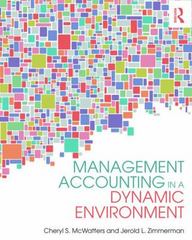Steve Johnson sells sportswear for a wholesaler to retail shops. Retail shops like to have 30 days
Question:
Steve Johnson sells sportswear for a wholesaler to retail shops. Retail shops like to have 30 days to pay after receipt of the goods. Unfortunately, retail shops often have financial difficulties and fail to make timely payments and in some cases no payments at all. Steve’s manager, who has never visited the retail shops, makes the decision whether to require collection on delivery (COD) or allow the store to pay in 30 days. Forcing the store to make payment on delivery often deters the shop from making a purchase. Steve, who visits each store, argues that he should have the right to make the decision on allowing for payment within 30 days.
a. How would the wholesaler benefit from Steve making the decision to allow for payment within 30 days?
b. What types of performance measures should be used for Steve, if he is not given the responsibility to allow for payment within 30 days?
c. What types of performance measures should be used for Steve, if he is given the responsibility to allow for payment within 30 days?
d. Should Steve be evaluated on increased sales or the level of uncollectible accounts receivable? What are the trade-offs between these two measures?
Step by Step Answer:

Management Accounting In A Dynamic Environment
ISBN: 9780415839020
1st Edition
Authors: Cheryl S McWatters, Jerold L Zimmerman





